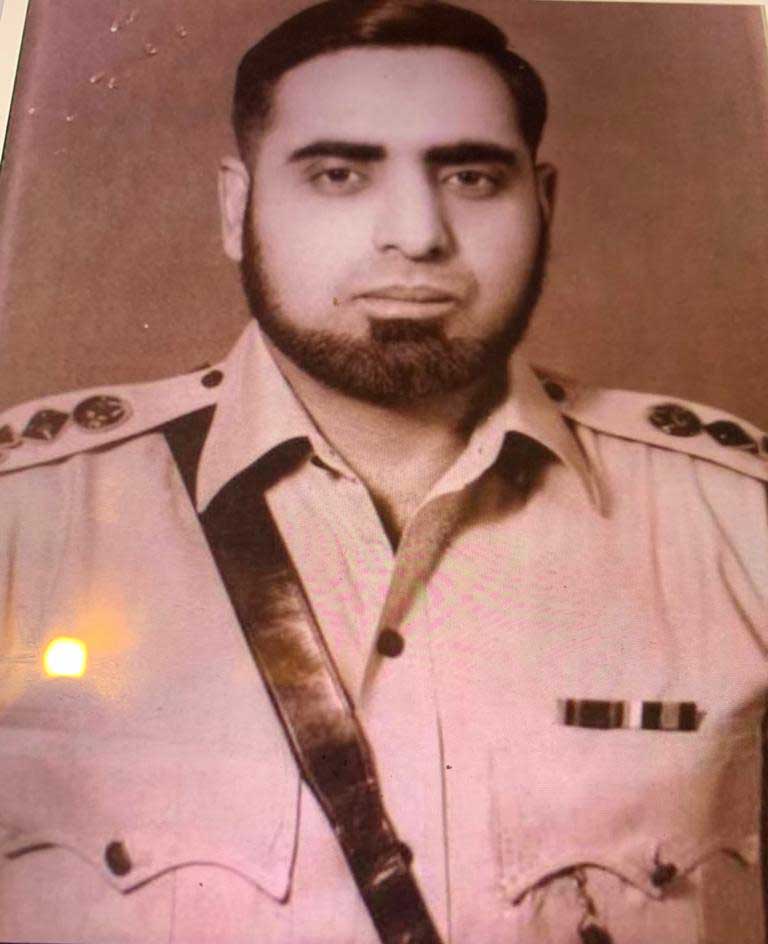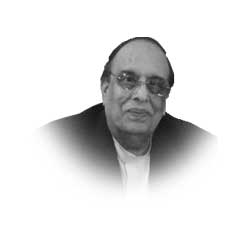By: Col (Retd) Imtiaz ul Haque
Martyrdom is not just we call death; it is something bigger than that, higher than any rank, over and above any achievement. When a soldier embraces martyrdom, the eyes of the beloved ones may have tears and sorrows, but they are also covered by the aroma of pride, glory and honour. One such pride we feel of a brave son of soil, who stood guard rock solid against the enemy aggression, didn’t move an inch from its advance and laid down his life in the line of duty.

There are hundreds of unsung heroes like Lieutenant Colonel Muhammad Akram Raja whose tales of valour and acts of gallantry have not come to limelight, but as a colleague I am duty bound to pen down this great epic story of Col Raja whom I call the Martyr of Barapind. He was the Commanding Officer (CO) of 35 FF Regiment, which he himself raised on 19 April 1971 at Abbottabad, and took it to Chaman, its peace location, in May the same year. The unit had lot of reservists and ex-servicemen, mostly volunteers, who were put through extensive training in order to make it battle worthy, that too in the shortest possible time. When things got hot in September 1971, his unit first moved to Mahesar (Sindh), and then to Khanpur (Punjab). How this extensive movement and travelling was carried out by the brave men and officers of this young battalion is another story; the battalion had to travel almost 200 miles every night, in the hours of darkness, which was itself a Herculean task.
The unit first stayed at Khanpur for nearly two months; here too it carried out rigorous training before the war broke out on 3 December 1971, in the Western Sector. Then it was ordered to move to Fort Abbas where it took up defensive position. Again, it received the orders to move to Sialkot Sector whereupon reaching, it carried out ‘Relief in Line’ operation and took up ‘defensive position’ at Mirowal-Rayya Khas area, in Narowal Sector. The unit again moved to Shakargarh and Zafarwal, and finally to Pindi Porbian – a village 3 miles east of Zafarwal, on 16 December 1971. The unit kept on pouring till late at night, on 16-17 December.
Lt Col Muhammad Akram Raja was given the orders to launch a counter attack in the Barapind-Jarpal area where the enemy had penetrated with added numerical strength. The Commanding Officer moved his unit from Pindi Porbian to a forming up place (FUP) near Barapind. The enemy attack went on, approximately at 05.20 a.m., with full force and strength. The attack was so fierce and so forceful that the CO, Lt Col Akram Raja, decided to lead himself the counter attack from the front. This was something, which the enemy wasn’t expecting. The Indians got surprised as Raja and his four company commanders were leading from the front.
Thick battle took place that continued for 5-6 hours in the cold and foggy morning amidst a lot of smoke emanating from the explosives being used by both sides. Lt Col Akram Raja fought with extraordinary courage, bravery and determination that he inflicted a lot of casualties on the enemy. His surprise counter attack forced the enemy to pull out its infantry and bring forward its battle tanks. Despite that there was no match with the tanks, Col Raja showed an unshakable determination and did not budge even an inch from his position. With his personal example and highest level of heroism, he embraced martyrdom. His extreme act of bravery and supreme sacrifice for the motherland led to strengthen the morale of his officers and men, who stood as a rock in front of the enemy and laid their lives one after another. This intense battle continued for 5-6 hours; the loss on Pakistan’s side was heavy – 60 soldiers including 4 officers, 1 JCO and 55 other ranks – embraced Shahadat, which was a very high rate of casualties by any standards. The number of wounded rose to 200-figure, but the enemy could not advance despite heavy casualties on our side. The same evening, ceasefire was announced because the East Pakistan tragedy had taken place. A war that our brave men valiantly fought was lost because of many reasons. Lt Col Muhammad Akram Raja Shaheed was one such son of this soil, whose gallantry and chivalry surprised the friends and enemies alike. On the morning of 18 December, the first day of the ceasefire, the enemy unit’s commanding officer, Lt Col V P Airy wrote a personal note about the very daring act of Col Raja. He minced no words of praise for Col Raja despite being an enemy.
Lt Col Akram Raja Shaheed was awarded the prestigious Hilal-i-Jurat (HJ) in recognition of his daring act of bravery, courage and valour, though many believed that his bravery of highest level deserved no less than Nishan-i-Haider. He was from Haripur and he received his early education from the native school and later did his studies at Gordon College Rawalpindi. After completing training at PMA, he joined 9FF and subsequently commanded it. In the 1965 War, he was GSO II at Dhaka. He served on various command, staff and instructional appointments. The 17 December 1971 was the culmination of his meritorious career. He embraced shahadat leaving behind a great story of courage.
The nation owes respect and honour to such brave sons of soil who selflessly fought in defence of the motherland and sacrificed their lives for the integrity and sovereignty of the country. We fail! But screw your courage to the sticking-place, and we’ll not fail. The coward dies a thousand deaths, the valiant, only once!







